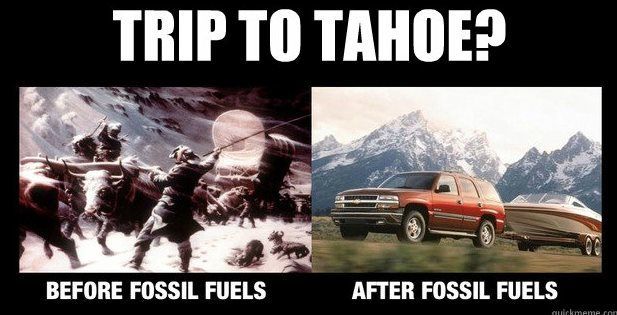A free, shortish book defends – and celebrates – oil and coal.
Alex Epstein gave a presentation at Vassar College recently about the importance of fossil fuels in our daily lives. The Vassar Greens student group responded by accusing him of being racist and sexist (see the e-mail reproduced here).
Young people attending liberal arts colleges apparently have a Book of Bad Words. Whenever someone says anything that conflicts with their lamentably predictable worldview they reach into that book and fling those words around willy-nilly.
Who needs evidence? Who needs to be contextually relevant? You’re evil. We hate you. It stands to reason you must be racist and sexist, too.
Such is the quality of thinking that $60,000 annually in tuition and other academic fees now purchases.
Unlike his close-minded campus critics, I’ve actually read Epstein’s book. It’s called Fossil Fuels Improve the Planet. A lovely-on-an-iPad PDF edition – as well as an ePub version – may be downloaded here for free.
In the PDF edition, the main text spans 50 pages, followed by a couple of appendices and some endnotes. Which means you can read the entire thing in a few hours.
Do yourself a favour and get it today. The experience will be as invigorating as a splash of cool water. Forever more, jargon such as “fossil fuel addiction,” “coal is poison,” and “carbon pollution” will be mere chaff in the wind.
Epstein is the Founder and President of the Center for Industrial Progress. He describes his job as educating
the public about the incredibly positive role energy and industry, particularly the oil industry, play in their lives. [p. 43]
His arguments are so persuasive, so sensible, that the reader is left wondering what in Hades is wrong with our society that we almost never hear anyone say these things.
Like yours truly, Epstein refuses to romanticize nature:
If you want to see what “dirty” looks like, go to a country that is still living in “natural,” pre-industrial times. Try choking on the natural smoke of a natural open fire burning natural wood or animal dung.Try getting your water from a local brook that is naturally infested with the natural germs of all the local animals. [p. 4]
We’re taught to think of our environment as something that starts out healthy and then we make dirty. The opposite is true. Nature does not give us a healthy, sanitary environment to live in. Try keeping your home environment clean without “unnatural” indoor plumbing, sewer systems, and garbage collection. [p. 18]
Nature does not provide us with.the environment we need to live long, healthy, happy lives; hence the historical life expectancy of 30. [p. 22]
Occasionally, Epstein waxes poetic about the capitalist system in a manner that some people will find jarring (on page 36, for example, he refers to “the true beauty of capitalism”). But you don’t have to buy-in to his economic analysis to connect with his larger message.
In a nutshell: our long, well-fed, rewarding lives rely on the robust, abundant, affordable energy currently being generated by coal and oil. To demonize that energy because it isn’t perfect, because it has shortcomings, is to be “incredibly spoiled and ungrateful” (p. 6).

Epstein argues that activists such as Bill McKibben not only refuse to acknowledge the immense benefits associated with fossil fuels, they also stack the deck. Fixating on oil’s deficiencies, they compare it not to feasible, here-and-now alternatives, but to “a nonexistent and impossible utopia” (p. 25).
Just as ordinary women can’t compete with surgically-altered, expertly-lit, professionally airbrushed centerfold babes, even an impressive power source can be made to seem inadequate when juxtaposed with a fantasy.
Out here in the real world, our water purification, sewage treatment, pharmaceutical production, and medical systems depend on industrial-scale energy. Only three sources are currently capable of providing that: fossil fuels, nuclear plants, and hydro-electric facilities. As Epstein makes clear,
low concentration and high intermittency [solar and wind sources] have proven unable to provide substantial baseload power in any country, ever, even when exorbitantly subsidized. [p.31]
Epstein also does a brilliant job of dismembering two of environmentalism’s favourite buzzwords:
“Renewable” or “sustainable” implies that the ideal life trajectory is one of repetition, using the same methods and materials over and over.
But that is an ideal fit for an animal, not a human being. The human mode of existence is to always get getter, always improve.
If we cast aside the Green religion, “renewable energy” is a false ideal that has no place in a rational discussion of energy. The only question that matters about energy is: What sources of energy will best advance human life now. [bold added, pp. 36-37]
In Epstein’s words, oil is “the lifeblood of civilization.” It has “revolutionized health care,” “revolutionized agriculture,” and “to exaggerate, only slightly, ‘solved world hunger’” (p. 42).
These are arguments that need to be heard. Read the whole thing here.






